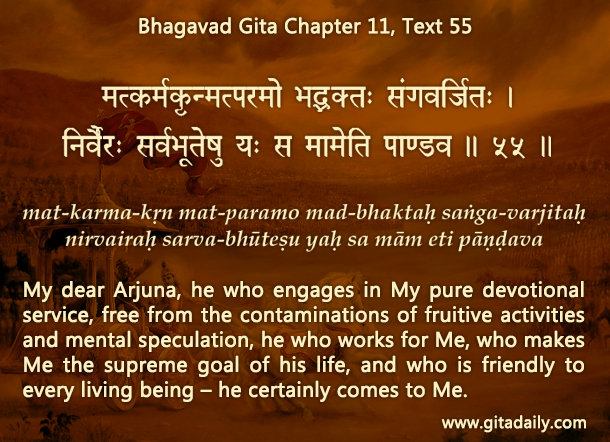The remarkable conclusion to the Gita chapter on the universal form – In the Bhagavad-gita, the eleventh chapter reveals the kala-rupa, the form of time in its destructive manifestation. Not only did this form depict how almost everyone on the battlefield will be destroyed, but it also called upon Arjuna to assist in that war (11.33). This call can be disconcerting, given that our world is haunted by the specter of violence in the name of religion.
Intriguingly though, Krishna concludes this Gita chapter by describing how Arjuna (and by implication all of us) can come to him (11.55). While listing five to-dos, Krishna lists one that is striking: be free from animosity toward all living beings. Why striking? Because a common cause for war is animosity, wherein one party hates and wants to eliminate the other party for their many perceived or actual wrongdoings. Arjuna too could have easily dwelt on the many atrocities the opposing Kauravas had perpetrated against his family and taken that as an impetus to fight. Krishna categorically tells him to avoid such animosity.
Krishna’s clear caveat points to the real import of the whole chapter: it is not a call for all of us to fight, as Arjuna is called to do; it is a call to harmonize with Krishna, which Arjuna can do in his context by fighting. Such harmonization requires us to free ourselves from emotions that disconnect us from him — and one such prominent emotion is animosity. Krishna is everyone’s well-wisher (05.29) and he wants us all to be similarly disposed, as he will specify in the next chapter (12.13).
Why, then, does Krishna want Arjuna to fight? Because in that specific situation, the opposing army was adamantly opposed to Krishna’s plan to establish dharma for the world’s good.
One-sentence summary:
Krishna’s core call is not to fight, but to become an instrument for the Divine, which requires freedom from animosity, the cause of most fighting.
Think it over:
- Why can reading the Gita’s eleventh chapter be disconcerting?
- What is remarkable about the conclusion of the Gita’s eleventh chapter?
- How is the Gita’s circumstantial call related with its universal message?
***
11.55: My dear Arjuna, he who engages in My pure devotional service, free from the contaminations of fruitive activities and mental speculation, he who works for Me, who makes Me the supreme goal of his life, and who is friendly to every living being – he certainly comes to Me.
To know more about this verse, please click on the image


Leave A Comment